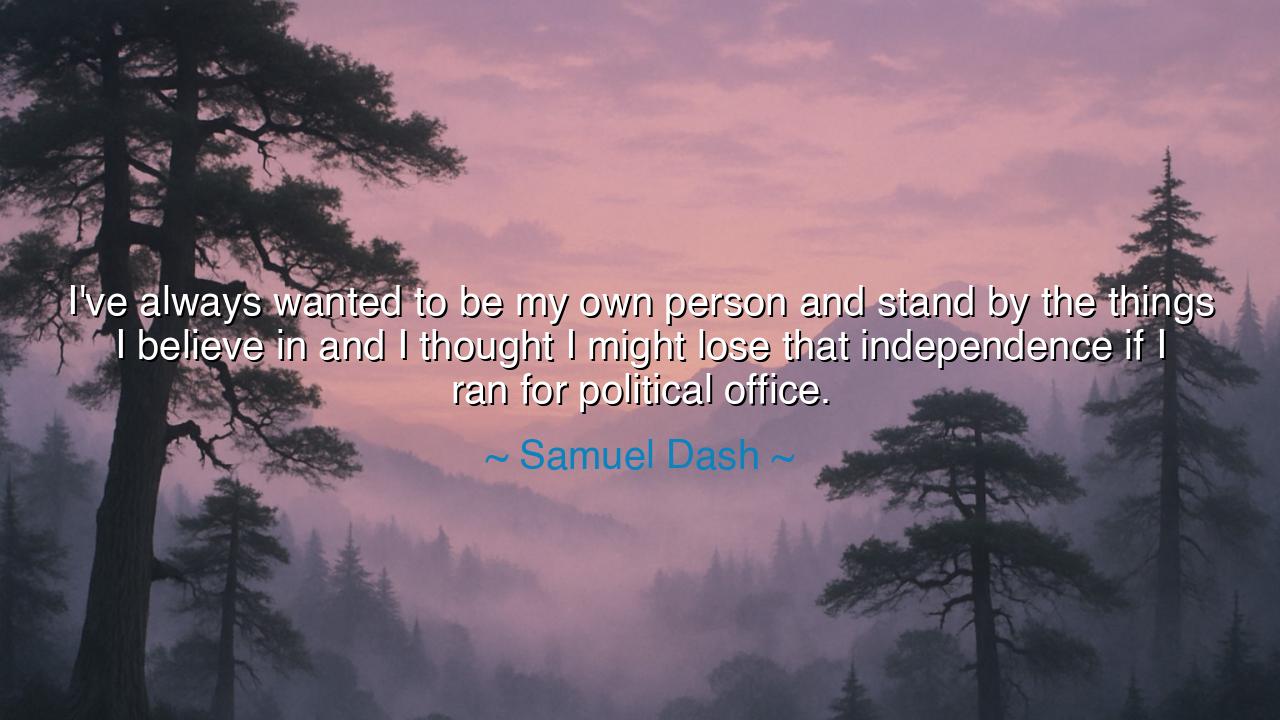
I've always wanted to be my own person and stand by the things I
I've always wanted to be my own person and stand by the things I believe in and I thought I might lose that independence if I ran for political office.






Hear the thoughtful and resolute words of Samuel Dash, the moral voice of law and integrity, who once said: “I've always wanted to be my own person and stand by the things I believe in, and I thought I might lose that independence if I ran for political office.” In these words, there speaks not the ambition of a man seeking power, but the wisdom of one who values truth over title, conscience over career, and independence over influence. His voice echoes through the corridors of history as a reminder that the highest form of service is not always found in office, but in the unyielding defense of one’s own moral compass.
The origin of this quote lies in Dash’s lifelong devotion to justice and ethical principle. Known as the chief counsel during the Watergate hearings, he stood before the nation not as a politician, but as a guardian of the law’s integrity. He had seen firsthand how power can tempt even the noblest hearts, how men who begin with conviction may end in compromise. Thus, when offered the seductive call of political office, he chose instead the harder path — the path of the independent mind, unswayed by party, untouched by ambition. His independence was his shield, his instrument of truth.
To stand by one’s beliefs in a world driven by influence is an act of quiet heroism. The ancients would have honored such a man as a philosopher rather than a ruler — one who governs not others, but himself. In Dash’s words, we hear the eternal tension between power and virtue, between the desire to serve and the danger of being consumed by what one seeks to master. He reminds us that there is a price to be paid for keeping one’s integrity whole, and that many, in seeking greatness, lose the very soul that made them worthy of it.
Consider the example of Cincinnatus, the Roman farmer who was called to lead his people in time of crisis. He took up the burden of command, defeated his nation’s enemies, and then, when victory was secured, laid down his power and returned to his plow. He had tasted authority and found it wanting compared to the purity of his own independence. Like Cincinnatus, Samuel Dash understood that the true strength of a man lies not in his command over others, but in his command over himself. For there is no higher office than that of one’s conscience.
Dash’s words also bear a lament for our age — for a world in which the independent voice is often drowned by the noise of factions and the hunger for approval. He feared that politics, though noble in intent, can enslave the spirit of those who enter it without armor. Once bound to parties, donors, and public favor, even the purest heart may find its convictions dulled by the constant compromise demanded of governance. His decision not to run for office was not retreat, but resistance — a refusal to trade clarity for convenience, or principle for popularity.
But his message is not only for statesmen. It is a lesson for all who would live with integrity in a world of persuasion and pressure. Whether in the marketplace, in art, in faith, or in friendship, the struggle remains the same: to hold fast to what is right, even when the world rewards submission. Dash teaches that independence is not isolation; it is the courage to remain whole when others bend. It is the sacred ability to act not because one must, but because one believes.
Thus, let this be the lesson of Samuel Dash — that the greatest victories are not won in elections, but in the quiet triumphs of the soul. Guard your independence as your most precious possession, for it is the foundation of both honor and peace. Speak what you believe, even if your voice stands alone. Choose integrity over influence, and truth over advantage. For while power fades, and applause dies, the man who has remained his own — steadfast, unbroken, and true — will endure like a pillar against the storms of time.
And so, my children, remember: the world will often tempt you to trade your beliefs for acceptance, your conviction for comfort. Do not yield. Be your own person. Let your words and your deeds spring from the deep well of principle, not the shallow tide of praise. For as Samuel Dash showed, one who guards his independence guards his very soul — and no crown, no title, no fleeting favor can ever outweigh the dignity of a free and faithful heart.






AAdministratorAdministrator
Welcome, honored guests. Please leave a comment, we will respond soon